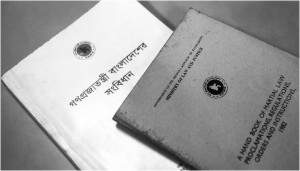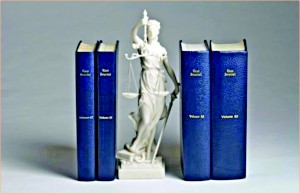
Constitution: Assaults of amendments
Asif Nazrul
 |
Photo: Rashed Shumon |
IF you are starving to death, you cannot sue the state; but if you cannot speak out or write something, you may!
This is the way I tend to introduce our constitution to the seemingly non-listening students of my classroom. They get barely any time to disagree as I quickly explain: "Have you ever heard that starving people have sued the government for its failure to provide food, you have not! But you may know that some authors, whose books were banned, had successfully done it and got those bans withdrawn by the Court." I pause before throwing the ultimate question: which book provides these perplexing rules? Answer is, none but our constitution, yes the constitution, the supreme law of the country!
I am not a constitution-hater, nor an anti-constitution element. So the introduction was only a strategy to lead to a substantive discussion on the importance of the constitution in our life. However, the reality is if someone carefully goes through our constitution, it may also appear as a stupid book of rules on some accounts. We know that the 1972 constitution was drafted at a time when the global scenario was different: the economic rights had hardly been recognized, the environmental issues had largely been ignored, and the institutions of accountability had greatly been mystified. So we understand why it failed to establish enforceability of economic rights or omitted to reflect environmental concerns or lacked in spelling out a system of good governance. But what about the later amendments of 1972 constitution? Where do we see the concern for emancipation of the poorest people, the respect for citizens' rights, and the awareness of global developments on constitutionalism?
Almost nowhere! Not even in the much-hyped recent judgments in the 5th and 7th amendment cases which have, in my view, made a mess in a few areas. The widely acclaimed 5th amendment judgment has not actually upheld the 1972 constitution even in some areas where its provision has been usurped by martial law proclamation. The 7th amendment judgment has failed to even notice the brutal attack on 1972 constitution by the infamous 4th amendment. These judgments along with almost all the discussions and debates on constitutional reforms have also fallen short of reflecting the high spirits and principles (for example with regard to right to information, enforceability of economic rights like right to food and water and the essentials of good governance) enshrined in the new constitutions of various African, American and East European countries.
As a result we have failed to effectively build on the 1972 constitution. Rather, we appear to have regressed on many accounts. The aforesaid judgments have also done little to enhance and beef up our constitution and constitutional governance.
The first amendment of the constitution was made in 1973 for enabling and facilitating the trial of war crimes and crimes against humanity. This is one of the very few amendments which could be termed as a progression of constitutional order and citizen's rights. If we map out later amendments, most of them were essentially a regression of the strength and high morals of 1972 constitution.
 |
Photo: SK Enamul Huq |
a) Fundamental principle of state policy: Secularism was incorporated as one of the fundamental principles of state policy in the 1972 constitution when all our South-Asian Neighbors except India (which incorporated secularism in 1974) had their own brand of state religion or state preferred religion. In the factual context of the 9 months long liberation war, it was a progressive, although not accurate (in view of connotation, the accurate term should have been non-communalism) move which projected Bangladesh as a tolerant society in the world. Within 5 years, this founding principle of state policy was changed; secularism was replaced by absolute trust and faith in the Almighty Allah. Further, a new clause was inserted in Article 8 of the constitution which states that absolute trust and faith in the Almighty Allah shall be the basis of all actions and an existing Article i.e. Article 12 of 1972 constitution that had defined secularism was deleted altogether! Following these footsteps of Ziaur Rahman regime, Ershad in 1988 inserted a new Article (Article 2A) in the constitution which declared Islam as the state religion of the Republic.
The 5th amendment judgment has failed to fully repair this scar. Although it has ordered restoration of secularism and re-instatement of Article 12, it has not repealed Article 2A, the existence of which would make both meaningless to a large extent. To explain: Article 12 defines secularism as a policy which, among other things, requires elimination of “granting by the State of political status in favour of any religion”, whereas Article 2A has unambiguously granted such political status to Islam by declaring it as the state religion. The 7th amendment judgment too fails to address this anomaly, although it has questioned and then negated the very legality of Ershad regime which produced this Article.
b) Fundamental rights: The 1972 constitution recognizes as judicially enforceable right only those rights which are civil and political in nature. These include freedom of movement, speech, association, assembly, religion and so on. Another equally, if not more, important judicially enforceable right of 1972 constitution is the right to some safeguards to be enjoyed upon arrest. These safeguards are right to be informed of the reasons of arrest, to consult a legal practitioner and to be produced before the nearest magistrate within 24 hours of the arrest. The 2nd amendment of the constitution made during Bangabandu Sheikh Mujib regime delimited the application of these safeguards by introducing the provisions of preventive detention. Further, by inserting new clauses in Article 26 and 142 as well chapter IXA in the constitution, the 2nd amendment has respectively allowed curtailment of fundamental rights by amending the constitution and suspension of all fundamental rights through emergency laws. While preventive detention and emergency provisions are common in South-Asian constitutions, those in 2nd amendment are harsher than the relevant provisions of the Constitutions of India, Nepal and Pakistan. No substantive move, either at the judiciary or parliament, has yet been undertaken to suggest any modification of these provisions.
c) Organs of the government: Reflecting the high morals of parliamentary democracy, the 1972 Constitution has made the continuation of the tenure of technocrat (non-elected) ministers conditional upon their election as member of parliament within 6 months of their appointment. The 4th amendment of 1975 has deleted this provision. The later amendments including the 12th amendment that restored parliamentary democracy and the later judgments including the 5th amendment judgment which premised on restoring 1972 constitution have ignored the revival of this provision. The 4th amendment attacked on the strength of other two organs of the government (parliament and judiciary) more emphatically. Among other things, it deleted the provision that requires constitution of the parliamentary committees at the first meeting of each session and expanded the application of undemocratic provisions of Article 70 of the constitution. Although 4th amendment was heavily criticized by the beneficiaries of the brutal killing of Bangabandu, some of its contents including the above changes are retained till today. As regards judiciary, the 4th amendment changed the provision of 1972 Constitution which demanded mandatory consultation with the Chief Justice in appointing other judges of the Supreme Court. The 4th amendment has also curtailed the authority of the Supreme Court in appointing, controlling and disciplining the subordinate judiciary. In spite of the historic judgment in Masdar Hossain case that ruled for independence of lower judiciary, the 5th amendment judgment has left the issue of restoration of relevant provisions 1972 constitution to the discretion of the Parliament.
 |
Photo: Jupiterimages/Getty Images |
There are many other instances where the constitutional amendments have diluted or curtailed citizen's rights, strength of the parliament and democratic spirit of 1972 constitution. For example: the authority of investigating complaints against the judges of the Supreme Court was granted to the Supreme Judicial Council (a body comprising the Chief Justice and two other most senior judges of the apex court) by the 5th amendment, although this authority belonged to the parliament under the 1972 Constitution. The Supreme Court, in its 5th amendment judgment, has retained the Supreme Judicial Council which means this product of an “illegal and unconstitutional military regime” shall prevail over corresponding provisions of 1972 Constitution. As the fundamental premise of the 5th amendment judgment is the prevailing of the 1972 constitution over the 5th amendment, this is a serious departure from that premise the reason for which has not been convincingly explained in the judgment. This lacuna may instigate some people to think that the judges of the apex court have accepted this martial-law proclaimed change of 1972 constitution as it suits their own interest.
The finding is our constitution has been battered, weakened or imbalanced by various forces. The Fifth Amendment judgment has brought back four founding fundamental principles including secularism, although it would be of little substance in view of the presence of state religion. This judgment has rejected the legality of martial law in strongest terms, but that too would mean little to future conspirators unless the government takes steps to punish the living perpetrators by applying the relevant provisions of the Penal Code of 1860.
The seventh amendment judgment has reiterated the spirit of the 5th amendment judgment in invalidating extra-constitutional rule and the 8th amendment. However, some of its observations and omissions may spur further debate. For example: while the fifth amendment judgment has, “for wider public interest” retained Article 6 as modified by the 5th amendment according to which our nationality is Bangladeshi, the seventh amendment judgment has ordered that “Steps should be taken by the government to remove the impeding factors, the Appellate Division cited, in order to restore original Article 6, i.e., Bangalee Nationalism”. It would also be of little academic value for the researchers because of its lack of objectivity. For example, it has presented a context of the judgment including by describing the “frenzied events of repeated onslaught on our Revered Constitution” without even mentioning the impact of 4th amendment. Both these judgments may appear somewhat misleading as they repeatedly order restoration of 1972 Constitution without elucidating whether or not they actually meant restoration of 1972 Constitution with the first three amendments.
The Law Ministry has very recently printed the constitution ' in the light of 5th amendment judgment' and kept it secret from the public eye. But, as the said judgment lacks precision and clarity, its translation into constitution requires "legislative" analysis which can not be done by the Law Ministry, a part of the executive branch fo the Government. Further, as reported in the national dailies, the way the Law Ministry has done it has already been found erroneous and even contradictory to the 5th amendment judgment itself! I wonder where it would take us at the end!
Where should we now start from? Who would fix all the anomalies of our present constitution? How? Some of us know some of the answers. We must start from and build on the 1972 Constitution. This rebuilding job must be undertaken by the Parliament. The Supreme Court's judgments, the pro-people provisions of new constitutions (for example: South Africa, Rumania, Nepal), the constitutional debates of recent years (for example for amending Article 70 or for making the higher judiciary more independent, or for specifying state obligation for implementing economic rights) must all be taken into account in discharging that responsibility.
Should we not all agree? Should not we protect our constitution from the assaults of later amendments and rebuild it for our next generations?
Asif Nazrul: Political Analyst, Researcher and Professor of Law of the University of Dhaka.